Twelve scholars join faculty
Twelve distinguished scholars have received faculty appointments at the University this year and have joined their new Chicago colleagues in the Biological Sciences Division, the Division of the Humanities, the Physical Sciences Division, the Social Sciences Division, the Divinity School and the Graduate School of Business.
The 12 new professors are: Michael Dawson (see story on distinguished service professorships and named chairs), Richard Fehon, Joe “Skip” Garcia (see http://chronicle.uchicago.edu/050526/garcia.shtml ), Mark Hansen, John List, Viswanathan Natarajan, Eduardo Perozo, Stephen Raudenbush (see story on distinguished service professorships and named chairs), Wilhelm Schlag, Michael Sells (see http://chronicle.uchicago.edu/050428/sells.shtml), Douglas Skinner and Mark Slouka.
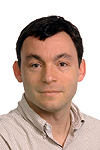 Richard Fehon | |
Fehon studies signal transduction pathways, the molecular mechanisms that regulate how cells receive, process and respond to information from the environment. His research focuses on how the components of these pathways are organized by cells into specialized complexes that can integrate signals from many different pathways and distinguish between distinct functions of a single pathway. He studies this process primarily in fruit flies, which allows him to manipulate individual genes and learn how specific genes work together on a particular cellular or developmental process.
He is co-owner of five patents related to his research and has ongoing grant support from the National Institutes of Health and the United States Army’s Neurofibromatosis Research Program.
Fehon graduated magna cum laude from Duke University in 1980 with a B.S. in zoology and completed his Ph.D. in zoology and developmental biology at the University of Washington in 1986. He did his postdoctoral training at Yale University then joined the faculty at Duke University in 1992.
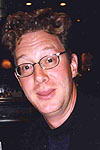 Mark Hansen | |
Mark Hansen comes to Chicago from Princeton University, where he was an associate professor in English. He also has taught at Southwest Texas State University, Villanova University and the University of California, Irvine.
Hansen is the author or editor of several books, including the forthcoming The Politics of Presence; New Philosophy for New Media (2004); Bodies in Code: Interfaces with New Media (2004); The Cambridge Companion to Merleau-Ponty (2004); and Embodying Technesis: Technology Beyond Writing (2000). His current projects are titled Fiction After Television, or Towards an Aesthetics of Affective Response and Humanizing the Posthuman.
Hansen has been awarded numerous awards and fellowships. Among them are the 2003 Sophomore Initiative Grant for developing at Princeton University an interdisciplinary sophomore course called Text and Image; Best Published Article by an Untenured Scholar from the Society of Literature and Science in 2001; a Mellon Fellowship in the Humanities from Stanford University from 1999 to 2000; and the Karl J. Root Preceptorship from Princeton University from 2000 to 2003.
He earned both his M.A. and Ph.D. from the University of California, Irvine, and his B.A. from New York University. He also has studied at the University of Konstanz in Germany as a Fulbright scholar and at the University of Paris.
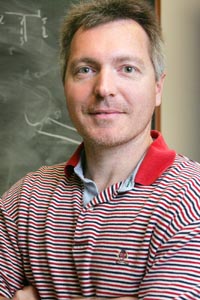 John List | |
List is best known for pioneering the use of field experiments in economics. His work has stimulated a new area of study that explores economic behavior in naturally occurring environments with controlled experimental methods.
He is the author of numerous articles on myriad subjects, varying from the economic aspects of environmental regulation to whether social preferences are important to markets.
He has studied decision-making in the marketplace, oftentimes finding that experienced agents conform well to neoclassical theory. For example, List has found that inexperienced agents are best described by “endowment effects”—when investors attribute added value to that which they already own—whereas experienced agents typically do not have such preferences. This result has importance for normative economic theory, damage resolution, benefit-cost analysis, and appropriate property rights regimes.
List comes to Chicago from the University of Maryland, where he was a professor of economics. He previously taught at the University of Arizona and the University of Central Florida.
In addition to his faculty appointments, he is a faculty research fellow at the National Bureau of Economic Research, university fellow at Resources for the Future, and Extramural fellow at Tilburg University.
He received a B.S. in economics from the University of Wisconsin-Stevens Point in 1992, and a Ph.D. in economics from the University of Wyoming in 1996.
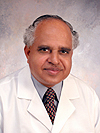 Viswanathan Natarajan | |
An authority on vascular biology related to the lungs, Natarajan is known for performing translational research designed to lead to new treatments to reduce airway inflammation and pulmonary edema.
A key member of a team of researchers who came to Chicago this year from Johns Hopkins University, he studies oxidant-induced signal transduction and lung injury, regulation of endothelial NADPH oxidase, mechanisms of regulation of phospholipases A2 and D, and generation of lipid second messengers—such as oxygenated derivatives of arachidonic acid, phosphatidic acid and lysophosphatidic acid in the lung—and the role of bioactive lipids as modulators of airway inflammation and endothelial cell homeostasis. He is the principal investigator or project leader for several NIH grants to study airway inflammation and lung injury.
Born in India, Natarajan earned his B.S. in chemistry in 1968 from the University of Bombay, his M.S. in chemistry in 1970 from the University of Madras, and his Ph.D., in biochemistry in 1975 from the Indian Institute of Science in Bangalore. He did his postdoctoral training at the Hormel Institute at the University of Minnesota, then taught at the Mayo Clinic and the University of Minnesota at Austin before joining the faculty at Indiana University School of Medicine in 1989, where he rose to full professor in 1996. He moved to John Hopkins University, as a full professor, in 1998.
The author of more than 120 journal articles, Natarajan serves on the editorial boards for several journals covering biochemistry and physiology. He has lectured widely on his research and has won numerous awards, including prizes from the Indian Council of Medical Research, the National Science Foundation and the American Lung Association.
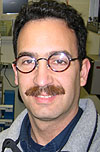 Eduardo Perozo | |
An expert on the structure and function of ion channels—the membrane proteins that are responsible for the generation and spread of electrical signals in neurons, muscle and other excitable cells—Perozo uses a wide variety of techniques to understand the electrical, biochemical and structural mechanisms used to regulate these ubiquitous membrane proteins. His work focuses on potassium channels, a large superfamily of related proteins that control the transport of potassium ions across the membrane, and mecha- nosensitive channels, which respond to membrane tension during osmotic responses in bacteria.
Born in Venezuela, Perozo earned his B.S. in biology from the Universidad Central de Venezuela in 1985 and his Ph.D. in physiology in 1990 from the University of California at Los Angeles. He did postdoctoral training in the Jules Stein Eye Institute and the department of chemistry and biochemistry at UCLA, and he worked for two years as a researcher at the Venezuela Institute for Scientific Investigation in Caracas,before joining the faculty at Virginia in 1996.
The author of more than 30 articles in peer-reviewed journals and a dozen review articles and book chapters, Perozo has lectured worldwide. He serves on the editorial board for the Journal of General Physiology and the Biophysical Journal. He has been honored with a Pew fellowship (1991-1993), and with a neuroscience fellowship when he was named a McKnight scholar (1998-2000).
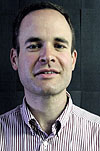 Wilhelm Schlag | |
Wilhelm Schlag has been a faculty member at the California Institute of Technology since 2001, and prior to that appointment he had been a member of the mathematics faculty at Princeton University.
From 1996 to 1997, he was a visiting member of the Institute for Advanced Study in Princeton, where he also was a member in fall 2001. He was a member of the Mathematical Sciences Research Institute in Berkeley in fall 1997.
Since 2001, Schlag has served as editor of Geometric and Functional Analysis. In 2003, he was organizer of the program on Harmonic Analysis and Partial Differential Equations meeting at the Park City Math Institute in Utah.
Schlag has given invited talks at universities across the nation and in Germany, Sweden, Portugal and Canada. In 2001, he was the recipient of one of the Alfred P. Sloan fellowships awarded that year, which are given to promising young scientists early in their careers.
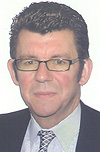 Douglas Skinner | |
Skinner’s research interests include corporate financial reporting and disclosure practice and corporate payout policy.
Since 1989, Skinner has been a faculty member at the University of Michigan Business School, serving as the KPMG professor of accounting and from 2001 to 2003 as accounting chair. He was the Neubauer Faculty Fellow and a Visiting Professor of Accounting in the GSB from 2003 to 2004.
Douglas Skinner served as editor of the Journal of Accounting and Economics from 2000 to 2005. He also has served as associate editor of the Asia-Pacific Journal of Accounting & Economics, and he has served on the editorial advisory and review board of The Accounting Review. He is a member of the American Accounting Association and the American Finance Association.
Skinner’s numerous journal publications include “Employee Stock Options, EPS Dilution, and Stock Repurchases,” with Daniel Bens, M.H. Franco Wong (Assistant Professor of Accounting in the GSB), and Venky Nagar, published in the Journal of Accounting and Economics; “The Role of Supplementary Statements with Management Earnings Forecasts,” with Amy Hutton and Gregory Miller, published in the Journal of Accounting Research; and “Are Dividends Disappearing? Dividend Concentration and the Consolidation of Earnings,” with Harry DeAngelo and Linda DeAngelo, published in the Journal of Financial Economics.
Skinner earned a B.Ec. in accounting from Macquarie University in Sydney, Australia, in 1985, an M.S. in applied economics from the University of Rochester in 1988, and a Ph.D. in accounting from the University of Rochester in 1989.
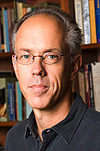 Mark Slouka | |
Mark Slouka comes to Chicago from Columbia University, where he was an associate professor in the writing division, and where he also earned his B.A., two M.A. degrees and a Ph.D.
His novels include the forthcoming The Death of Water and Fire, as well as God’s Fool (2002) and Lost Lake (1998). His nonfiction titles are Hitler’s Couch and Other Essays (forthcoming) and War of the Worlds: Cyberspace and the Hi-Tech Assault on Reality (1995).
Slouka’s book, God’s Fool, was named San Francisco Chronicle Book of the Year and Washington Post Book of the Year in 2002; his book, Lost Lake, was named a New York Times Notable Book in 1999 and also earned that same year a California Book Award.
Slouka is the author of many articles and short stories, including the short story “The Woodcarver’s Tale,” which won the 1995 National Magazine Award in Fiction. His work has appeared in such publications as Esquire, Harper’s Magazine, the San Francisco Chronicle and the Georgia Review, and his writing also has been published in Best American Essays, appearing in the 1999, 2000 and 2004 editions.
Slouka has been the recipient of fellowships from the John Simon Guggenheim Memorial Foundation and the National Endowment for the Arts.
In addition to teaching at Columbia, Slouka also has taught at the University of California, San Diego, Pennsylvania State University and Harvard University.
![[Chronicle]](/images/sidebar_header_oct06.gif)